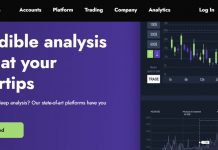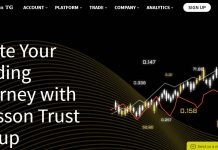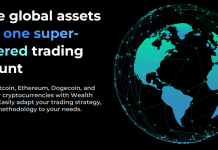 XTB invites for a series of webinars with ex-Goldman Sachs trader and industry legend – Lex van Dam. Meeting will be held weekly all July. More details you can find here. This was the opportunity to interview our guest – Lex van Dam!
XTB invites for a series of webinars with ex-Goldman Sachs trader and industry legend – Lex van Dam. Meeting will be held weekly all July. More details you can find here. This was the opportunity to interview our guest – Lex van Dam!
You are considered as the most successful hedge fund manager in the UK. What makes you so special?
I didn’t know that was the case, that sounds a bit intimidating to me! On a serious note, I never really thought that I could be considered as “the best” or as “one of the best”- I don’t allow myself to reflect with such vanity. I just aim to perform what is my profession to the best of my abilities, being fortunate that trading also happens to be my passion which has helped me to overcome more challenging times. All I’m focus on is the work, my skills and self-development.
In my seminars, I always say that the moment you think you are great at trading, you have to step down and take a break. That’s because it’s the first and the most important step on the road to an unpleasant end of your trading career. It is important to keep your emotions in check as this is precisely when one can easily lose it all.
Of course I am grateful for any recognition from my industry peers and clients, it means a lot to me, but my focus in on something else. I believe the financial industry can achieve more working together, exchanging skills, knowledge, and resources to create more opportunities for individual traders and investors, and that is what I prefer to occupy my thoughts contemplating.
What was the most difficult moment that you have faced during your career?
You are faced with constant challenges in trading, so it is more a question of how you manage them and evolve to become mentally more resilient. That for me has been a continuous battle and in order to persevere I have learnt not to view any such challenge in isolation or ruminate over the outcome.
The most important thing is to try and learn from the situation and simply move on. This is often easier said than done; one only has to think back to the financial crisis when people were losing their jobs and thinking that the markets would never recover – and here we are 8 years later with many equity markets all-time highs. I am grateful to still be around and empower my students at the Academy to take control of their own investments.
In your TV program Million Dollar Traders, you’ve managed to successfully train 8 novices new to the market to achieve remarkable results. Do you think that anyone can be a trader?
The Million Dollar Traders TV project showed the psychology and the ability of the ordinary people in trading; those were the people who did not have privileged careers in the City and it proved that there are a lot of smart people out there and hopefully it proved that a lot of people can do more than it is often portrayed. Yet it also showed that trading is not for everyone. Some traders we took on the TV show really struggled.
It means even with good maths, great personal and professional characteristics, and also even after they had good training before they were given money to trade, some of them really struggled to press sell/buy button. What does it mean? Trading is as much about being well prepared as it is also about courage and not being afraid of taking responsibility for your actions even knowing you are playing against the market and can never be 100% which way it will go for your money. Many people choose to not have this stress and they can never be traders.
While those who do trade also know that this is one of the greatest jobs to have: there are many moments of great rewards and never ending learning as well as regular ‘head-checks’ to make sure you are in the right mindset which makes it for me personally as well the most fascinating profession. I hope in the next life I come back as a trader again!
Are there big differences between how hedge funds and individuals trade the market?
There are some similarities, but also some major differences. Unlike being a trader at a bank, you are risking your own capital as an individual and are free to make your own investment decisions without restriction. In this regard it is similar to a hedge fund, where the partners will often have a significant amount of their own money in the fund alongside outside money from investors.
Whilst hedge funds enjoy a greater degree of freedom in terms of their strategies and what they choose to invest in, compared to say a mutual fund, there is still an investment council that ideas require approval from before they can trade. As an individual, there is of course no council and no outside investors to explain all your decisions to – which might be a blessing or a curse depending on how disciplined you are in your own trading.
The main contrast between how hedge funds and individuals invest is probably technology, and the informational advantage that professionals have over the public. Take for example the data systems and execution facilities that hedge funds have access to, not to mention their team of analysts, traders and portfolio managers all managing this every minute of each day. This is before you consider funds that employ high frequency trading (HFT) or machine learning algorithms that can identify an opportunity and execute trades in nanoseconds. There is no way that the typical investor can compete, and it is becoming an increasingly large share of trading activity in the market.
That said, the one edge that the public may have over hedge funds, if they have the right approach, is time. This goes back to my earlier point about not being accountable to investors – you don’t need to report your results every quarter so you can be patient with an idea and stick with the trend over a long horizon. It has certainly worked for Warren Buffett!
How does your day as a trader look like?
My day typically begins in the very early hours of the morning, when most people are still sleeping. I always have my phone to hand to check on the futures markets overnight and see whether there is anything happening in the Asian session that I need to be aware of on my way in to the office.
I’m at the desk for 7.00am where I read the major news wires and international newspapers, and look at the hundreds of messages I’ve received overnight. I look at what’s going on in equities, fixed income, credit and commodities markets to give me a little bit of an indicator about what’s likely to happen in Europe that day. This also includes company earnings and economic data due out that day, and how it might affect the portfolio.
Between 8.00am and 4.30pm I monitor my portfolio, I talk to brokers, I watch the markets, I analyse trade ideas. I put on new trades or positions, so it’s work on the portfolio, managing the risk and changing it.
Between 4.30 and 5.30 there might be some meetings or research and I go home and watch the markets and have some dinner. I will still be checking Bloomberg on my phone in case something happens outside of the European session. Having said that, sometimes there is just absolutely nothing happening, and you also have to deal with that too. You need to be smart in terms of preserving your energy to be able to do it all again the next day with necessary focus.
Do you have any particular goals that you want to achieve when trading? Do you have specified deadline for them?
My goal has always been to still be trading the next year. It sounds simple enough, but in such a complex and competitive environment it is easy to commit mistakes that could potentially end your career. It’s a like being a top athlete – you want to compete at the major events, and in order to do so, you need to follow your process and approach each day with the right mindset in order to perform in the moment.
There is a saying that I like along the lines of “there are old traders, there are bold traders, but there are no old, bold traders”. The market will always be there, so my focus is on doing everything I can to ensure that I am still around to trade it and capitalize on future opportunities. When you love what you do, your ultimate goal is to continue doing it for as long as you possibly can.
What would you say are your favorite kinds of setups?
Fundamental analysis is a necessary part of my trading process, but I do enjoy trading technicals too. At Goldman Sachs we employed a lot of technical analysis and that approach has remained with me throughout my career. One of the things I like is how everything ultimately comes back to the price on the screen and volatility. Irrespective of the research process preceding it, price is the only thing that matters once you have a position.
Whilst I find it inconsistent to trade on technicals alone, I think that anyone who ignores them is at a significant disadvantage in terms of trade timing, targets and position management. There is much to be gained from understanding the sentiment and positioning in a particular trade, and can provide an edge over the consensus position.
In terms of specific setups, I share many of these in the courses available at www.lexvandam.com and will be showcasing some of my favourites in the upcoming webinar series.
Trading is about many ups and downs – how do you deal with disappointments connected with trading the markets? Do you feel that such periods make you not only stronger, but also a better trader?
Trading is never easy, and is often painful. If you enter the world of trading with expectations other than this, then you should expect to be disappointed. Accepting this has allowed me to develop my own mental toughness and become a better trader. Like many things, trading is won and lost in the mind, and it is a constant challenge keeping your emotions in check. I can say that after almost 30 years of trading it certainly doesn’t get any easier.
However, if you have the right motivation and understand your reasons for trading, it will be far easier to see through the difficult periods that are inevitable in the markets. Another important thing is to ensure that you maintain this and remain energized by having other interests outside of trading.
I like to play football at least a couple of times during the week with friends who do not necessarily work in the industry to get my mind away from things. I have seen countless people who were once incredibly enthusiastic and ‘loved’ the market burn out and become overwhelmed by a difficult period because they were immersed 24 hours per day in the endless flow of information.
Do you think that events like Brexit or Trump’s win could appear more often in the future? How would you prepare for something unexpected?
We’ve always lived in unpredictable times. You should always be prepared for unexpected. People seek safety, and in the trading world they seek a magic formulas or a good market environment, but waiting for safety is one of the biggest mistakes one can make in general. Nobody is ever safe and nobody can ever predict the markets or events in the world. Once you know that, life in general and life as a trader becomes much easier.
Brexit was predictable and so was the US Presidential Elections result if one was following closely global politics, the economic shift between powers, and the Internet empowering people around the world to have a voice and the diminishing influence of the world’s elites to control the events in their favour. Elites and governments lack trust in each other while we should already be working together to tackle the challenges the world is facing today.
As a trader or investor, you have to listen and try to understand that a lot of what is happening around you might just be an opportunity and you have to learn to not ‘panic’, no matter what is happening in the news. Even if you choose not to trade during the times when there is heightened expectation around a particular event, it is still no reason to panic.
Whilst many courses teach only one style of trading, to endure as a successful investor, I believe that you need to be prepared to adapt to an ever-changing market environment. For this reason I teach both shorter-term trading strategies and a portfolio-based approach within the course. The course focuses more time on medium to long-term investing, given that short-term opportunities tend to occur less frequently and aren’t apparent for as long. I teach and use myself a combination of these methods, and I always emphasize the importance of developing your own approach so that you aren’t dependent on any strategy in isolation.
Lex, you are conducting the 5 lessons course for XTB. If you were to choose a part of a lesson in which you reveal what you consider to be the crucial element of your trading skills, which would it be?
To be honest it’s hard to answer such question! Being a trader is a rough way to make a living and there are many skills that could be considered as crucial. But if I were to choose the most important part, I would choose lessons from 4 to 5. That’s because in the second part of the course we show how to connect fundamentals with technical analysis. As far as trading is concerned, I believe that fundamental analysis is as important as the technical one and a proper use of both of them is key.
What’s more, you can’t forget about the mindset that we discuss in the fourth lesson. Fundamental analysis + technical analysis + appropriate mindset – that should lead to a success in trading. So yes, I think that the crucial element can be found in lessons from 4 to 5.
*Lex van Dam is an external expert and financial educator at the Lex van Dam Trading Academy and is in no way affiliated with, endorsed or sponsored by XTB or any of its affiliates or subsidiaries.








![Reltex Group Reviews: Explore business opportunities by Trading [reltexg.com]](https://comparic.com/wp-content/uploads/2023/12/image001-218x150.jpg)
![Mayrsson TG Reviews: Why Choose Crypto-Trading with Them? [mayrssontg.com]](https://comparic.com/wp-content/uploads/2023/12/image1-218x150.jpg)








